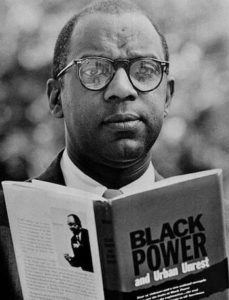
Nathan Wright Jr.
*Nathan Wright Jr. was born on this date in 1923. He was a Black author, minister, activist, and educator.
He was from Shreveport, Louisiana, and grew up with his twin brother Benjamin Hickman Wright and their sisters in Cincinnati, Ohio. His father, Nathan Wright Sr., was an insurance agent and the executive secretary of the Cincinnati National Association for the Advancement of Colored People (NAACP). His mother, Parthenia (Hickman) Wright, taught school. Wright attended St. Augustine’s College in Raleigh, North Carolina, in 1941 and 1942 and then transferred to Temple University in Philadelphia, Pennsylvania, in 1943 and 1944.
He served in the U.S. Army Medical Administrative Corps during World War II. After the war, he returned to school and graduated from the University of Cincinnati in 1947. The same year, he joined the Journey of Reconciliation, a religious peace organization sponsored by the Congress of Racial Equality and the Fellowship of Reconciliation. Wright and seven other Blacks, accompanied by eight whites, rode together on buses in the upper South, publicizing the 1946 decision of the U.S. Supreme Court that outlawed segregation on interstate buses.
Wright earned a doctoral degree from the Episcopal Theology School in Cambridge, MA, and was ordained a minister in the Episcopal Church in 1950. While a minister in Boston, Wright became friends with Louis Walcott, a parishioner who would later be known as Louis Farrakhan, leader of the Nation of Islam. A prolific writer, Wright was an internationally renowned scholar whose research focused on the rise of the Black Power movement in the 1960s and 1970s. As an activist, he was seen as a moderating and conciliatory voice who advocated for Black Power as part of the Student Nonviolent Coordinating Committee (SNCC).
Wright suggested more aggressive tactics in the struggle for equality, alienating many mainstream American Civil Rights Movement leaders. In the aftermath of the urban insurrections in Detroit and Newark in 1967, Studs Terkel interviewed Wright about his book Black Power and Urban Unrest. Acknowledging that the term “Black Power” had become widely associated with violence, Terkel was especially intrigued by Wright’s subtitle: Creative Possibilities. The conversation that ensued identified power as an expression of the creative potentiality of life itself. In this respect, the interview underscores how much the Black Power movement could be understood to represent a veritable creative renewal of culture and political life in the United States.
Wright was the chairman of the First National Conference on Black Power in 1967, attended by more than 1,000 delegates representing 286 organizations. The New York Times noted that the event represented a major shift in Black intellectual life and quoted Wright as saying that his notion of Black Power depended “on the capacity of Black people to be and to become themselves, not only for their good but for the enrichment of the lives of all.” In 1969, he was the founding chair of the Department of African and Afro-American Studies at the State University of New York at Albany. As an ordained Episcopal minister, Wright served as the executive director of the Department of Social Work in the Episcopal Diocese of Newark, New Jersey. Later, he preached his lifelong message of self-reliance along the Eastern Seaboard.
He authored 18 books, including Black Power and Urban Unrest (1967), Ready to Riot (1968), Let’s Work Together (1968), and Let’s Face Racism (1970). In his sermons, lectures, and writing, he expounded on stewardship and social justice issues for over fifty years. Nathan Wright Jr. died on February 24, 2005, at the age of eighty-one from kidney disease.